Living and Working as an English Teacher in Taiwan
Rockets, Temples, and Tonal Languages
Article and photos by Brian Johnson
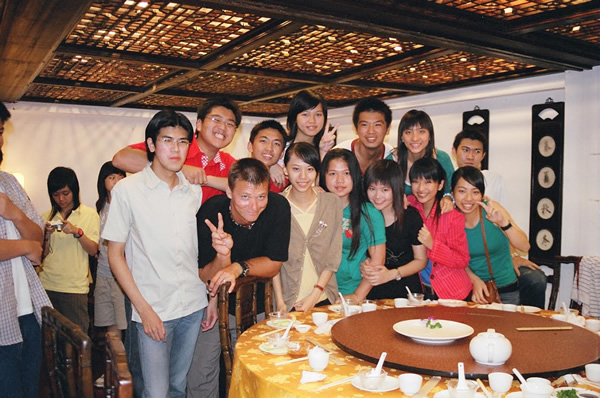
|
|
A very small percentage of my English students. The peace sign is a necessity for most pictures.
|
Culture Wars
I'm on the ground and I'm yelling at the top of my lungs. Rockets are flying all around me, exploding on the ground and in the air. I'm yelling and the bombardment is so loud I can't hear myself yelling. The thousands of
people that are around me crouch for cover. Some stand up straight, seemingly oblivious to the danger. They're yelling too, in a language I can't understand. My helmet has stopped more than one of the missiles already, and my coat has stopped
even more.
Suddenly, as quickly as the chaos began, it is over. My friends and I scramble to our feet, open our motorcycle helmet visors, and start laughing.
This is the Lantern Festival, and this is Yenshui, Taiwan. What would possess thousands of people to stand in front of a barrage of thousands of exploding rockets? If that's a mystery to you, than you probably have never
lived in Taiwan.
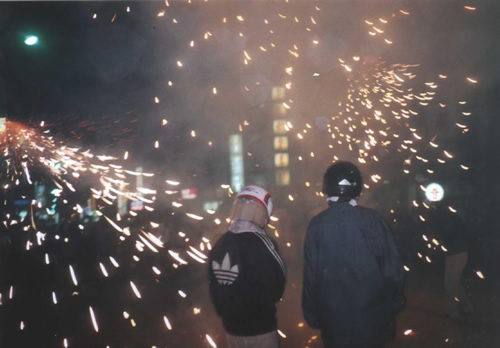
|
|
Yenshui is the place to be for the Lantern Festival. That is, unless you don't like firecrackers and rockets getting shot at your face.
|
I think about this as we speed through the night, carrying one of my friends to a Taiwanese hospital in the local ambulance. He decided not to wear a helmet, and had his ear split wide open from an exploding rocket. Injuries
like this happen at Yenshui every year. Finally the hospital is reached, and my friend gets his ear lobe stitched back to his head. As I sit there waiting, I realize that perhaps the most overused cliché in the world of traveling is
that a particular country is a land of contrasts. But, in the case of Taiwan, it's really the truth.
The Lantern Festival Celebration in Yenshui is one of the best examples of the paradox that typifies Taiwan. During the celebration, hundreds of thousands of rockets are shot off. Horizontally. Straight at you and a few
thousand of your closest friends. These days, it's basically a crazy show of light and sound and fury. But, like many things in Taiwan, it may be neon now, but it also signifies something. The fireworks were originally set off almost 200 years
ago to scare away evil spirits that had caused a plague.
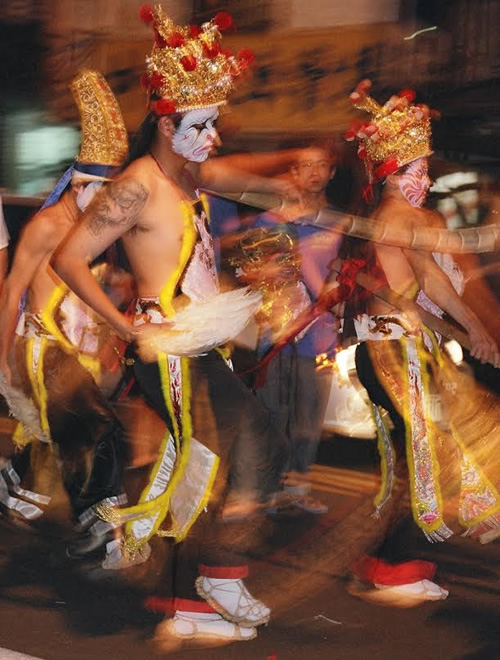
|
|
There are many religious festival and parades in Taiwan. They often include fireworks and dancers like these.
|
Today, scaring away evil spirits is still the official reason. But along with the traditional religious aspect, it's basically a huge excuse for tens of thousands of overworked Chinese to go crazy and take a chance on getting
blinded, burned, trampled, or all three.
This tension between tradition and the 21st century becomes very evident when living and teaching in Taiwan. Temples are almost as common as cell phones, and everyone has a cell phone. In Taiwan, the old ways and the computer
age exist side by side. It can be hard to tell if it is culture in conflict or co-existence. The rockets of history explode against the scooter helmets of today, but somehow it is not a fight so much as a dance. Taiwan is where McDonald's makes
regular spirit offerings, and places to burn special money to help out wandering ghosts are right next to 7-11.
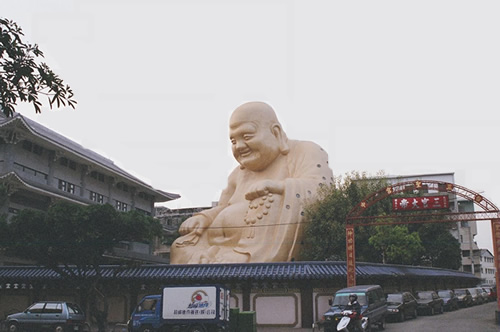
|
|
Temples and religious statues are everywhere in Taiwan. This golden Buddha was a short walk from my apartment.
|
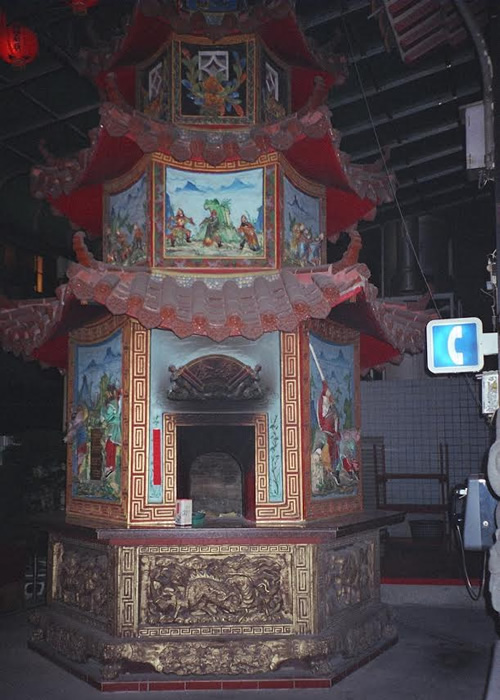
|
|
Temples and telephones are just one of the melding of worlds in Taiwan.
|
Family is very important to the Taiwanese. Extended family often lives together, and taking care of one's parents is hugely important. But, to provide for the family, Taiwan has some of the most workaholic habits in the
world.
The Job
While teaching at a private Chinese high school, I soon found out that the workaholism extends to the schools. I had 360 students, and they were all writing students. You do the math. All of a sudden, jumping in front
of exploding rockets sounded pretty good. One of the Chinese proverbs I learned very quickly was, "Squeeze all the blood out of the turnip." I was the turnip.
Friends and Food
I was also burning out. I found that having local friends and expat friends is a must for survival. With the expats, I played soccer and drank coffee. With the locals, I drank tea and found friends and travel companions
who could teach me more about the country.
Fortunately for overworked teachers, Chinese takeout is not just an American phenomenon. I soon had my three favorite places to eat. They knew me and knew what I liked. The food in Taiwan is cheap, it's fast, and it's good.
Traveling the Country
I learned that Taiwan has huge cities. This is partly due to the collective nature of Chinese culture, but it's also because the place is so mountainous. Taiwan is forced to build straight up and use space wherever possible.
In the mountains, there are much fewer people. Regular scooter rides to the mountains were a major sanity-saver. Almost everyone drives scooters. If you don't know how to drive one, learn before you go. Learn, and then realize that if you stay
in Taiwan a year, you will probably have at least one minor wreck. That's just how it is.
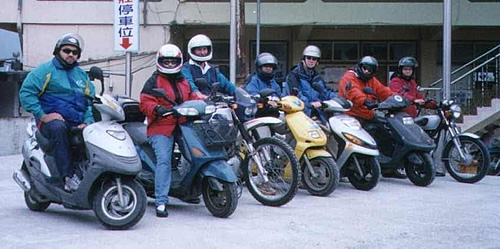
|
|
The open road, and 125 cc of pure power. Last one to the mountain waterfall is a century egg.
|
I had always thought that the silk Chinese paintings of mountains were beautiful, but not very realistic. That was before I went to Taiwan. In Taroko Gorge, one of the must-see places in Taiwan, I saw the mountains from
the paintings. They really do exist, and they're amazing.
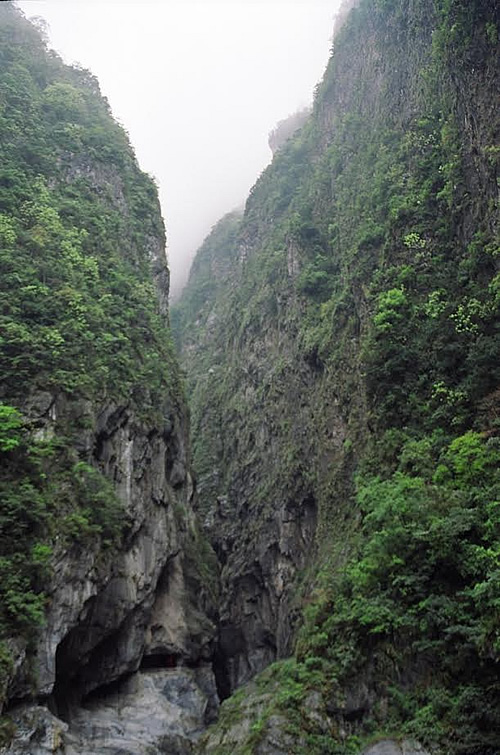
|
|
Taroko gorge is one of the many places called the eighth wonder of the world. But in this case, it really is.
|
There is a wide network of foreigners in Taiwan, and this, coupled with trips around the country, is a big help to enjoying life there. Working in a Chinese school, I was the fish out of water. And even though I had studied
Asian culture, the way that some colleagues treated me drove me crazy.
Saving Face
It drove me crazy until I was willing to look at things through Asian eyes. For example, there was The Meeting. It was a meeting of school staff, and it was about me. This would be OK, except that it was held without me.
Then another American teacher was asked to go explain to me how I needed to change. I did not appreciate this.
"They held a meeting behind my back!" But, this was culturally appropriate in Taiwan. It was how they would have approached the situation for a Chinese colleague, because direct criticism is not acceptable. Sometimes
it occurs, but it is not the norm. Saving face for others is very important, and to do well in Taiwan, and most other Asian countries, this is crucial to remember.
Super Students
My students were incredible. I had very few vacations, but their entire life was studying. School started at 7:30 a.m., and finished at 5:00 p.m. Then, many of them attended “cram” schools after that. They had
two weeks off for Chinese New Year, a few weeks off in the summer, and the rest of the year was academics. Almost all education is rote memory, and everyone is perpetually cramming for the Big Test, because it determines their university future.
Do well, good future. Do poorly, no future. This radical emphasis on studying often means that when compared to the U.S., high school students are very advanced academically, but socially their behavior is more similar to junior high. This
isn't necessarily a bad thing, but it helps to remember when creating lesson plans.
I also found out that when a student tells you their name, they are most likely not telling you their real name. Almost all English students choose an English name for themselves, and it often has no resemblance to their
Chinese name. This helps explain why students with names like Star-fruit Juice, Milk, and Corn are not uncommon. It also helped me understand why I suddenly started receiving homework from a student I had never heard of. If it's not your real
name, you can change it at will. This led to several conversations along these lines. "Who is this?" "Oh, that is Jay. He just changed his name to Maximilian. He did not tell you?"
My students were always the bright spot in my experience, even though there were 360 of them. They acted like I was a rock star whenever I taught them songs on my guitar. If you've never had a male high school student ripping
his shirt off and applauding while you're singing "Feliz Navidad" then beware, because it happened to me in Taiwan.
After a year of almost no vacations and a lot of English papers, I was heading to the US for the summer. This is when my students pulled out all the stops. They dressed up like it was prom, and took me out for a multi-course
Chinese banquet. Then, they roasted me in class, with one of my female students acting out my idiosyncrasies with hilarious perfection. I received multiple handmade scrapbooks, they sang "Take me Home, Country Roads," and then it
was time for me to fly away.
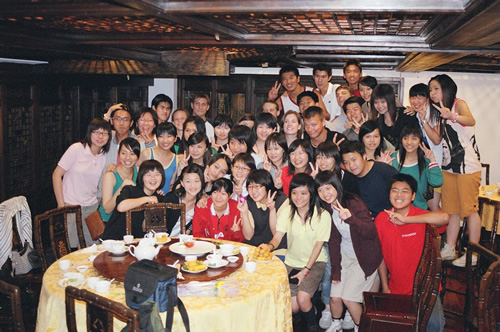
|
|
My English students.
|
Taiwan is an incredible experience. There is nothing easy about living or working there. The hours can be long, and the tonal language baffling. Being able to comprehend the culture can be as difficult as learning the language.
It's not easy. But, two months after I returned to the U.S., I was in a jumbo jet, flying over the Pacific Ocean once again. Destination Taiwan.
|
For More Info
Probably the single most helpful website for living and working in Taiwan is Tealit.com. It has everything from job listings to apartments to personal ads.
Hess International Educational Group is sometimes considered an "English cram school." It has multiple schools throughout Taiwan, and is always looking for teachers. As with most Taiwan teaching jobs, Hess requires a B.A. or an associate degree with a TESL license.
The most helpful guidebook I used while living in Taiwan was Lonely Planet Taiwan (Travel Guide), but there are many others.
|
Brian Johnson has previously written for Transitions Abroad.
|
